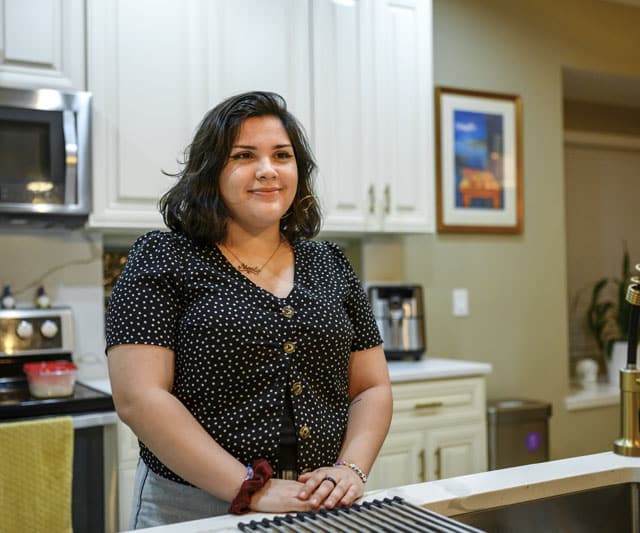Nicole Solero moved out of her parents’ home in Orlando, Florida, after she graduated from a community college in 2019. She worked as a freelance graphic designer in a small town in South Florida, but she felt lonely and depressed working remotely while her roommate frequently traveled for work. Solero decided to move back in with her parents.
The financial decision made sense to Solero, who said adult children living at home with their parents wasn’t really a source of stigma in her Hispanic culture. “We stay home until we are stable enough to move out,” she said, “and usually it’s until you’re married or until you have a career where you can provide for yourself completely.”
Solero, 24, now lives with her parents and her brother while she works as an intern at a public relations agency. She also does some freelance work. She helps her parents by occasionally paying for household expenses like food or laundry detergent, but she is able to save around $600 a month by living rent-free. She plans on moving out in the next two years, she said, after she secures a job.
Young adults are often encouraged to leave the nest as a rite of passage to establish financial independence and build a life and career away from their parents. But for some members of Generation Z and younger millennials, factors like the high cost of living, student debt, family obligations or cultural traditions keep them living at home for longer than expected. The pandemic and its resulting economic downturn also forced many young adults to move back in with their parents.
According to a Pew Research Center analysis using Census Bureau data, half of Americans ages 18 to 29 were living with their parents in July. And although more than one-third of Americans in a survey that the center conducted in October 2021 said it was bad for society for young adults to live with their parents, many young people said it was necessary to get closer to achieving their personal and financial goals.
Tim Morris, 23, graduated from college in 2021 with about $53,000 in student debt. He decided to move back in with his parents in Akron, Ohio, and has managed to reduce that debt to around $24,000. Morris describes his living situation like living with roommates who “pay for everything.” Besides his bills, he needs to worry only about paying for gas.
“It is not what I want, but I am putting up with it because it is helping me put a big dent in my loans,” Morris said.
Morris, an associate chemist at a silicone manufacturing company, makes about $2,800 a month after taxes and puts $850 of that toward his student loan payments. He also contributes to a Roth individual retirement account, a 401(k) plan and a brokerage account, and he is working to save around $14,000 for a year of rent for a future apartment. Morris also has an emergency fund of over $2,000.
One of the main challenges that come with living at home for Morris is the toll it has taken on his dating and social life. Both of his parents are retired, and he has to ask for permission to have friends over. Morris said he had been on few dates since moving back home, partly because he did not have his own space.
“It’s not that enticing to just date someone who still lives with their parents,” he said.
Morris still owes about $8,000 in private student loans and hopes to move out when he pays them off. He is aiming to reach this goal by the end of September.
When young people have student loans, hope to start a business or want to save up for things like a house or a wedding, living at home can be a good financial decision, said Jovan Johnson, a co-owner of Piece of Wealth Planning, a financial advisory firm. In terms of when to move out, Johnson said, it is important to make sure you have enough income to afford rent and your lifestyle as well as an emergency fund that includes three to six months of rent and basic expenses. He also stressed the importance of being emotionally prepared for that next step.
“Make sure you’re ready for that independence and what comes with it,” he said. “It is a little different when you’re on your own without that support.”
Living at home is necessary for Kiah Ranstead because she takes care of her parents, who are both disabled. Ranstead, 30, lives in Kent, Illinois, and helps out by doing household chores, managing her mother’s medication and taking her to doctors’ appointments.
Ranstead is unemployed while waiting to have carpal tunnel surgery, though she hopes to work in publishing one day. She owes $60,000 in student debt, which she hopes to pay off once she has a job. Her parents use their Social Security payments to pay for household expenses.
Ranstead said most of her peers had moved out of their parents’ homes. “I feel like I do get judged by them for living at home because I’m older and I’m not married and I don’t have kids,” she said. If she moved out, she said, she would have to hire someone to care for her parents.
Madison Simms, 23, moved back home to Pittsburgh after she became unhappy while working at her first job out of college at a mortgage company. Simms, who lives in a house with her mother and her sister, now has a job in investment management for Bank of New York Mellon.
When she was living in Silver Spring, Maryland, for her former job, she spent about $2,000 a month on rent, she said. Now, living at home, Simms has been able to replenish her savings, she said, and puts away around $800 a month in addition to about $625 a month in her 401(k) account.
“What really keeps me home is the amount of money I can save a month,” Simms said. She feels financially stable enough to start looking for her own place again, she said, but is looking to stay not too far from home.
c.2023 The New York Times Company. This article originally appeared in The New York Times.







